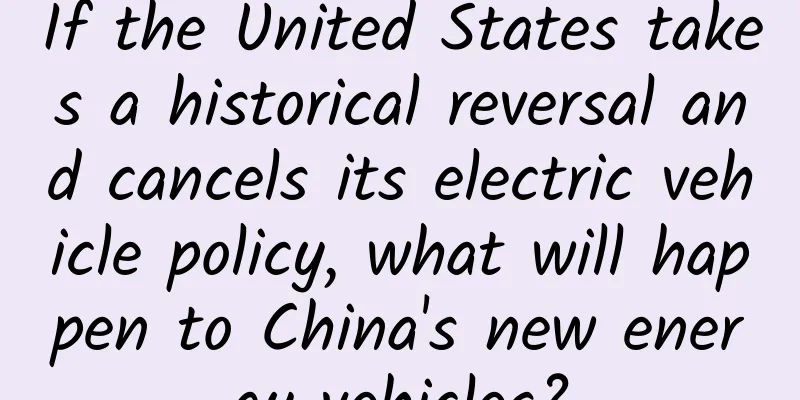If the United States takes a historical reversal and cancels its electric vehicle policy, what will happen to China's new energy vehicles?

|
About two years ago, the global automotive industry's transformation to electrification was seen as an inevitable trend, with only a few auto company bosses such as Akio Toyoda expressing opposition. By mid-2024, this trend was suddenly reversed. Many mainstream European and American manufacturers delayed their previously formulated electrification transformation plans, and the policy level gradually wavered or even regressed. The biggest variable here may be the United States, the birthplace of the electric vehicle industry. On July 18, former US President Trump publicly stated that if he was re-elected, he would abolish Biden’s electric vehicle policy on his first day in office to save the US auto industry that is "heading towards destruction." This statement has had a huge impact on the development of new energy vehicles around the world. Akio Toyoda questioned electric vehicles only because he wanted to develop hybrid vehicles and hydrogen-powered vehicles. He had no doubt about the general direction of environmental protection, energy conservation and emission reduction. But Trump was different. He directly called global warming a "green scam" and wanted to please votes from the American auto industry by supporting traditional fuel vehicles. If Trump really repeals the support for electric vehicles in the Inflation Reduction Act signed by Biden, he may also cancel regulations restricting exhaust pollution and expand U.S. oil production. Once implemented, these policies will have a profound impact on the global automotive industry, and may cause Japan, the European Union and other countries to delay or abandon their automotive industry transformation plans, and will also hurt the interests of China's new energy vehicle industry. As for how to treat Chinese electric vehicles, Trump said he would impose a 100% tariff on electric vehicles from Mexico, which is a springboard for many Chinese new energy manufacturers to enter the US market. But he also said that he supports Chinese companies to build factories in the United States. China accounts for more than 60% of the global new energy market share and has absolute dominance in technology. If Western countries collectively "stop playing" with electric vehicles, it will also pose new challenges to China's exports of new energy models. Unable to beat or catch up, once Chinese manufacturers go overseas on a large scale, they will be "overcapacity". The double standards of Western countries are clearly reflected. Let’s assume the worst case scenario, what should China do? First of all, it should be made clear that there is no possibility that China will give up new energy vehicles. The successful transformation of the domestic automobile market to new energy will bring China multiple benefits, including improving the ecological environment, gaining dominance in the automobile industry, creating a large number of jobs, reducing oil consumption, and promoting the development of green energy. China will definitely not give up this benefit. If countries other than China "stop playing", what can we do? There are many ways, but all countermeasures should be summed up in one sentence: products must be competitive. The rapid development of new energy vehicles in China is directly related to policy promotion, but the more important reason is that it does provide users with a better car experience. Needless to say, the rapid growth of the Chinese market, in overseas markets, China's new energy vehicle sales are also growing rapidly, and the reason for the growth is also due to the strong performance of the products. In a nutshell, to set sail, we need more brands and products that can be popular, such as BYD and Huawei. Take BYD as an example. From January to April this year, it sold 7,890 pure electric vehicles in Europe, a five-fold increase year-on-year. Therefore, everything still depends on product performance. Chinese consumers like Chinese new energy vehicles, and European consumers also like them. Improving product performance is the only way for Chinese new energy vehicles to cope with changes in overseas markets. BYD's independent research and development model is currently mainly used to promote its own development. It is very useful, but it is undeniable that not all manufacturers have the ability to conduct independent research and development. They need to rely on third-party suppliers to provide core components, and Huawei does this job. So far, Huawei has cooperated with many national car manufacturing teams such as FAW, JAC, and Changan, as well as partners such as Chery and SERES. Its main model is to empower major new energy manufacturers with various core components such as the Hongmeng smart cockpit, ADS3.0 intelligent driving system, DriveONE power platform, and Tuling smart chassis. BYD and Huawei are two different systems. BYD mainly relies on its own strength to occupy the market, and its positioning is Toyota and Volkswagen; while Huawei's positioning is "helping car companies to build better cars", and its positioning is similar to that of Continental or Bosch today, but the energy it can provide far exceeds that of Bosch. In addition, Huawei and BYD have formed such a division of labor at this stage: Huawei's models mainly occupy BB A's high-end market, while BYD mainly occupies the market below 300,000 yuan. The two have formed a combined force, but their purpose is the same, which is to enhance the overall strength and technical level of China's new energy vehicle industry. In fact, this was also the path that Japanese cars took when they went overseas. If you have good products, you don’t have to worry about artificial trade barriers. BYD’s cars are sold at prices several times higher in the European market than in China, but this still doesn’t stop consumers from buying them. This is the reason. In fact, the overseas market is not a monolithic entity. In the recent EU vote on whether to impose tariffs on Chinese electric vehicles, 12 votes in favor, 4 against, and 11 abstentions proved that there are huge differences within the EU. Germany, a major automobile country, and Hungary, a major automobile city in Europe, both insist on cooperating with China. China can use these countries to extend China's new energy industry chain through various forms of cooperation. Interestingly, on July 5, Turkey announced the cancellation of its plan to impose a 40% tariff on Chinese cars. On July 8, BYD announced an investment of US$1 billion to build a factory with an annual production capacity of 150,000 vehicles and a research and development center in Turkey. The level of tacit understanding between the two sides shocked the outside world. This is enough to show that China's new energy industry has been recognized by overseas partners in terms of product performance and technical strength. As long as these two points are grasped, China's new energy vehicle industry can break through the trade barriers in overseas markets and win the EU market. As for the US market, when key markets such as China, the EU, Southeast Asia, South America, and the Middle East all support new energy vehicles, Trump is going to reverse history and go back to traditional fuel vehicles with small courtyards and high walls, which is probably just self-admiration. As a winner of Toutiao's Qingyun Plan and Baijiahao's Bai+ Plan, the 2019 Baidu Digital Author of the Year, the Baijiahao's Most Popular Author in the Technology Field, the 2019 Sogou Technology and Culture Author, and the 2021 Baijiahao Quarterly Influential Creator, he has won many awards, including the 2013 Sohu Best Industry Media Person, the 2015 China New Media Entrepreneurship Competition Beijing Third Place, the 2015 Guangmang Experience Award, the 2015 China New Media Entrepreneurship Competition Finals Third Place, and the 2018 Baidu Dynamic Annual Powerful Celebrity. |
>>: 16GB iPhone 6S won't go away! This is the only way to use it
Recommend
"Being the heroine of a 1-hour idol drama", 3 revelations behind 2.34 million viewers
Most of us exist in social networks. In some even...
The Android system is becoming more and more mature, are you still using third-party ROMs?
The term "flashing" has almost no statu...
2022 Nobel Prize in Biomedicine is unexpected, human evolutionary genetics wins the prize for the first time
At 11:30 a.m. local time on October 3, 2022 (17:3...
After WWDC, Apple left many doubts, and Cook's ambitions began to emerge
Now Apple's Worldwide Developers Conference h...
Fun fact: One day in heaven equals one week on earth? Do people in heaven live longer?
From 2015 to 2016, NASA conducted a one-year &quo...
Chinese research team has made breakthroughs in intelligent oxygen production technology on Mars. Human migration to Mars is no longer a dream!
On the 14th, the team of Professors Luo Yi, Jiang...
Internet celebrity Zhang Mofan is suspected to be married. Netizens met Internet celebrity Zhang Mofan at the Civil Affairs Bureau and he was suspected to be applying for a marriage certificate!
Recently, some netizens broke the news online tha...
Cherish the time! Big data tells you that autumn is getting shorter in these places
Entering the Autumnal Equinox, most of northern m...
When iOS meets OS X: The boundary between mobile phone and computer operating systems is disappearing
With the launch of the new iOS 7, OS X Mavericks, ...
A complete marketing planning template!
The complete market plan is mainly divided into t...
Ctrip and Qunar’s marriage: Can the promised independent development be achieved?
[[153590]] During April Fools' Day this year,...
Rewriting textbooks, chemists broke a century-old rule | Science and Technology Weekly
Compiled by Zhou Shuyi and Wang Xiang Private jet...
Secret Ailao | What are the treasures in Ailao Mountain and where are the dangers?
On December 15, the Natural Resources Comprehensi...
Solactive: Future Trends in 2022
Solactive has released its “Future Trends 2022” r...
[Popular Science on Hot Fruits] Passion fruit has 100 kinds of aromas. How to open and enjoy it correctly?
Your browser does not support the video tag Where...









